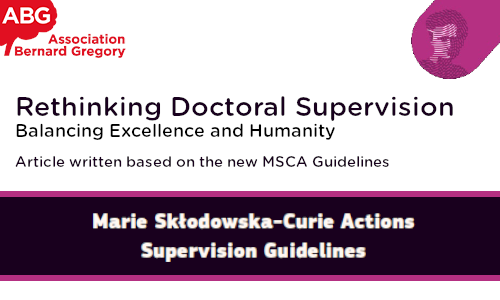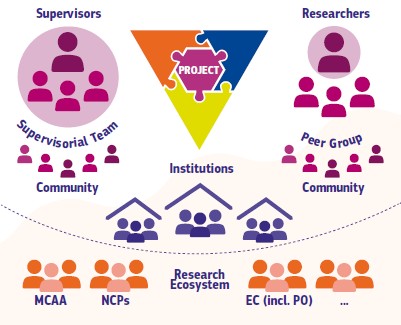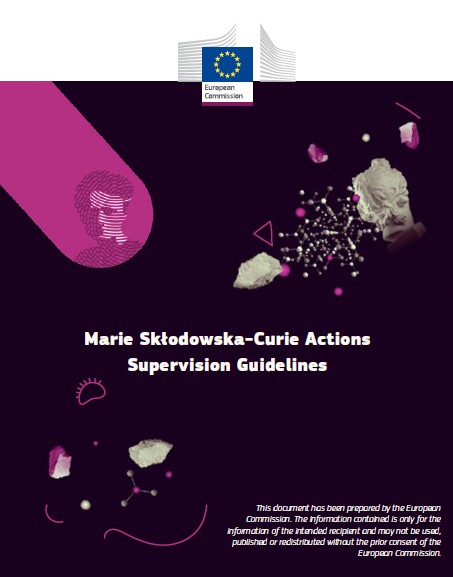

The Marie Skłodowska-Curie Actions (MSCA), the European Union’s flagship programme for researcher training and mobility, support thousands of scientists around the world every year. In January 2025, the European Commission revised its supervision guidelines, following a consultation process launched during the 2024 MCAA Conference in Milan, to better guide doctoral and postdoctoral supervision practices.
ABG shares these key updates and provides its critical analysis to shed light on this essential issue for research and innovation.
Main innovations in the 2025 Guidelines
The ABG approach: a concrete extension of the MSCA Guidelines
ABG training on supervision & European projects
Professionalize supervision within your organization
The revised document of the MSCA Supervision Guidelines does not constitute a regulation per se, but rather an evolving reference framework of good practices. It reflects a continuous improvement approach, built upon the experience and feedback of the wide network of researchers and supervisors involved in the Marie Skłodowska-Curie Actions and the MCAA.
While these guidelines do not create formal obligations, they nonetheless define a credible and influential benchmark to which any actor involved in doctoral or postdoctoral training would benefit from comparing themselves.
 The major conceptual innovation lies in the formalization of a structured “supervision ecosystem” built around a dynamic triangle:
The major conceptual innovation lies in the formalization of a structured “supervision ecosystem” built around a dynamic triangle:
This ecosystem is enriched by an extended network including the Marie Curie Alumni Association (MCAA), National Contact Points (NCPs), REA Project Officers, and all academic and non-academic organizations.
The 2025 Guidelines give a prominent place to shared supervision models:
These models take different forms: intra-institutional co-supervision involving several supervisors within the same organization, joint inter-institutional supervision promoting collaboration between institutions, and intersectoral supervision creating bridges between academia and industry — a model exemplified by the French doctorat CIFRE.
These approaches aim to:
For several years, ABG has supported research actors in the professionalization of doctoral supervision. Its approach, based on field experience, complements and operationalizes the recommendations of the Marie Skłodowska-Curie Actions (MSCA).
Both initiatives share a common vision: promoting supervision excellence centered on relationship quality and researcher development. ABG adds a pragmatic and managerial dimension, essential to putting these principles into everyday practice.
The MSCA Guidelines emphasize the need for alignment of expectations between supervisors and researchers. ABG turns this into a method: from day one, it encourages the co-construction of the doctoral project vision, where the doctoral candidate becomes an active player in their own trajectory.
ABG considers supervision as a specific managerial relationship, based on responsibility and communication.
Its training programs rely on:
This approach brings to life what the MSCA Guidelines state: demanding yet humane supervision.
The European Guidelines highlight the importance of structured onboarding for doctoral candidates; ABG complements this with a human and intercultural dimension. The first year is seen as a key period to build trust, transmit laboratory codes, and establish a shared culture rooted in mutual respect. It also emphasizes the importance of quality recruitment. Supervisors are encouraged to become familiar with interview techniques and identifying high-potential profiles. Recruiting a doctoral candidate means identifying a future research collaborator.
ABG emphasizes that successful supervision does not rely solely on institutional compliance, but on a balance between guidance and autonomy.
According to Dr. Vincent Mignotte, Training and Support Manager for Senior Researchers at ABG:
“The new MSCA Guidelines indeed provide a rigorous framework for doctoral supervision; however, the doctoral candidate is a young professional, and as such, bears part of the responsibility for the quality of the relationship with their supervisors. The document could have addressed this point in greater depth. ABG decided to tackle it through a dedicated training course for doctoral candidates entitled Bien vivre son doctorat, conceived as the mirror of the program for supervisors. What truly matters is the ability of both supervisors and doctoral candidates to exchange on their mutual expectations and to build a climate of reciprocal trust.”
Thus, the doctoral candidate should be viewed as a co-actor in their own training, demonstrating curiosity, creativity, initiative, responsibility, and perseverance.
ABG offers specialized training sessions on doctoral supervision designed to meet both European requirements and real-world needs. Designed and delivered by former researchers and supervisors with international experience, these sessions are based on the principles of the European Charter for Researchers and on the MSCA Guidelines (Marie Skłodowska-Curie Actions).
ABG’s training sessions are highly valued by participants — who find them practical and impactful — and by institutions, which recognize their strategic value and regularly entrust ABG with implementing such sessions.
Recent examples of collaborations with European projects and key research actors include:
Discover more examples of European collaborations with ABG
For over 10 years, ABG has supported the upskilling of supervisors, playing a recognized leading role in the professionalization and monitoring of doctoral supervision in France and Europe. This expertise translates into tailored training programs, built upon a deep understanding of both academic and industrial contexts.
Companies, research institutes, universities, foundations and other organizations wishing to professionalize their supervisors can benefit from:
Contact us to organize a session
Since 2023, the Michelin Group has been collaborating with ABG to jointly train the doctoral supervisors of its industrial teams together with academic researchers from the Auvergne Rhône-Alpes region.
This unique training fosters experience sharing and harmonization of practices between academic and industrial research environments, to the benefit of successful CIFRE doctoral projects.
Watch the cross-testimonies of participants and project leaders in the video below, which perfectly illustrates the spirit of innovation and collaboration fostered by ABG.
 To go further...
To go further...Marie Skłodowska-Curie Actions guidelines on supervision: https://europa.eu/!j6Hbdd
Marie Skłodowska-Curie Actions – Supervision guidelines: annex with best practices: https://europa.eu/!k94F3n
- Social media posts: MSCA’s LinkedIn
Article written by the ABG Editorial Team – Association Bernard Gregory